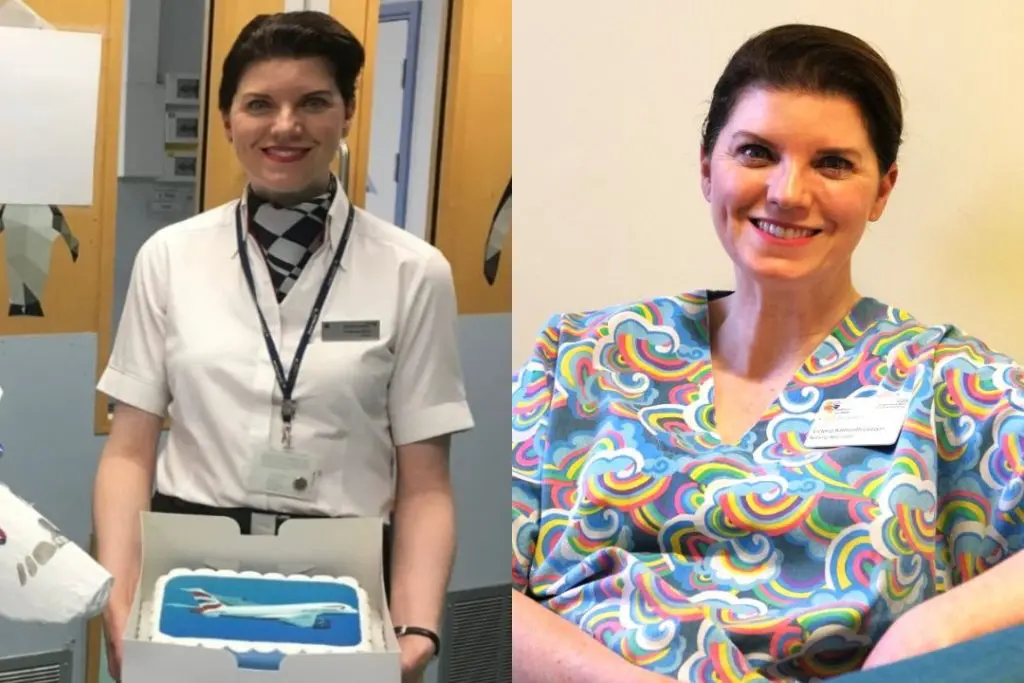
Ex-flight attendant on her career change into nursing
A former flight attendant who fell into nursing due to an NHS hospitality scheme during the Covid-19 pandemic has reflected on her unusual path into the profession.
Victoria Kinmonth-Gordon, a nursing associate based at Northwick Park Hospital’s neonatal unit, told Nursing Times about how she came into healthcare, and how her air-side skills have helped her in a hospital environment.
“Cabin crew had a set of skills that [the NHS] could really do with”
Victoria Kinmonth-Gordon
Ms Kinmonth-Gordon had worked for British Airways as a member of the cabin crew for around 26 years when the Covid-19 pandemic hit the UK.
Around the time the first national lockdown was announced, in March 2020, Ms Kinmonth-Gordon – like many other airline crew – found herself grounded, with most flights cancelled due to widespread travel restrictions.
Shortly after lockdown began, she found out about Project Wingman UK, an organisation set up to mobilise thousands of airline workers to help the struggling NHS.
Project Wingman saw 6,500 furloughed airline crew run pop-up, airport-style, first-class lounges in hospitals around the country, in which NHS staff were given a space to relax and decompress during the pandemic.
Ms Kinmonth-Gordon took part in this and, while working one of these lounges at Northwick Park, part of London North West University Healthcare NHS Trust, heard that the health service was looking to recruit people to entry-level care positions due to the success of Project Wingman.
“Cabin crew had a set of skills that [the NHS] could really do with: our interpersonal skills, our people skills, communication skills,” Ms Kinmonth-Gordon recalled.
She joined the hospital trust as an Agenda for Change Band 2 healthcare assistant (HCA), in January 2021, under the wing of an experienced ward sister who taught her foundational clinical skills.
“[The nurses] took a chance on me, and the rest is history,” she continued.
Ms Kinmonth-Gordon fully hung up her flight attendant uniform in October 2021 when she took voluntary redundancy from British Airways, and decided to dedicate herself to her role at London North West.
She found her calling in the neonatal unit, where she worked as a nursery nurse.
In 2022, she successfully applied for a nursing associate apprenticeship with Brunel University of London – something she was nervous about starting in her 40s.
“Initially I thought: ‘Gosh, I’m a bit old for apprenticeships,’ because coming from an airline, our apprentices… were all young people,” Ms Kinmonth-Gordon continued.
“I thought maybe I’m a bit too old to do an apprenticeship. But no, clearly not. Apprenticeships are for all ages, and so I was accepted at Brunel university.”
She recalled her fear of taking on an academic paper, and initially considering quitting on day one – before steeling herself and graduating the course as of the end of 2024. Ms Kinmonth-Gordon said she intends, in the next year, to apply for a registered nurse ‘top-up’ apprenticeship.
“It’s been a whole complete transition, a complete change of life,” she said. “I’m very grateful to my trust, Northwick Park and the NHS for this education. I can now write academic papers, pass, and do well.
“When I was flying five years ago, somebody said [I could] go to university. I just thought, ‘Gosh, no’.”
Ms Kinmonth-Gordon said some of the skills she picked up as airline crew had helped her in the hospital, in particular her ability to remain calm under pressure and dealing with people.
She said: “In the aircraft [we dealt] with tricky situations: passengers who are scared of flying, there’s delays or irate passengers… or when things are taken out of our hands with aviation, if there’s weather, and passengers are giving us a hard time, there’s nothing we can do about it.
“There’s also communication skills… poor communication and you lose an aircraft, and it would be similar in healthcare.”
“If there is a situation, how would you deal with this? You’ve got to be quick thinking in your actions”
Victoria Kinmonth-Gordon
She added that her experience with crisis management, including training for “extreme situations” such as terrorists on a plane, had also helped her.
“If there is a situation, how would you deal with this? You’ve got to be quick thinking in your actions, ” she told Nursing Times.
“Because if there’s a fire, you literally have less than 60 seconds to get that fire out on board an aircraft.”
Ms Kinmonth-Gordon said she had dealt with people from all walks of life as a flight attendant, including chief executives, royalty and politicians.
All of these skills, she explained, have been invaluable in her training to become a nursing associate.
Ms Kinmonth-Gordon added that the experience of such a sudden career change had been “overwhelming”, but also exciting and rewarding.
“I have had so much support from staff on the neonatal unit and lecturers,” she said.
“I think my first few weeks on a neonatal unit, I was a bit like a bunny in headlights. There was so much to learn.”
Ms Kinmonth-Gordon recently spoke at a Brunel University event for National Apprenticeship Week.
At this event, she told attendees that training to become a nursing associate has made her more confident, and that she could hold her own on a ward.
“This is only the beginning,” she added. “I’m just going to carry on and see where my journey takes me.”



